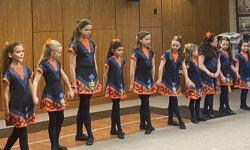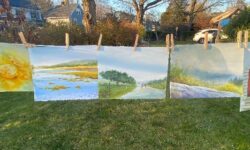By Amelia Tarallo
Hometown Weekly Staff
Today, there seems to be one question being asked when it comes to our identity as Americans: what makes each one of us Americans? Is it something as simple as where we were born or where we have citizenship? Or perhaps it is how long our family and culture has been a part of the United States?
It’s not a new questions, as pointed out by Ben Railton in his Tuesday, April 23, stop at the Needham Free Public Library. Visitors to the library were invited to hear Railton discuss his book, “We the People: The 500-Year Battle Over Who Is American.”
Railton, who is a professor at Fitchburg State University, began his talk by briefly examining the first words of the U.S. Constitution. “We the people” denotes certain aspects of inclusionary and exclusionary identity in the United States. Railton went on to highlight the idea of America as a great big melting pot - but one that also came with inclusionary and exclusionary expectations.
For his talk, Railton examined four of the eight specific cases his book discusses: Japanese-Americans during World War II, African-Americans during the Revolutionary War, anti-Filipino racism and exclusion, and Muslims in America following 9/11.
He began by looking at the treatment of Japanese Americans during World War II. Following the bombing of Pearl Harbor, the Federal Government took action to exclude any Japanese-American from enlisting in the U.S. military, as highlighted in the court case of Korematsu vs the United States, which argued the legality of Executive Order 9066. Executive Order 9066 ordered Japanese Americans to be moved to internment camps for the duration of World War II. This, of course, was an example of exclusivity that Japanese Americans faced.
The case of the Varsity Victory Volunteers, however, can be seen as an inclusive treatment of Japanese Americans. As their fellow ROTC members were enlisted into World War II, Japanese Americans were forbidden from serving. Upset by the government’s decision, Japanese Americans wrote a letter to the military governor of Hawaii, urging him to let them serve. The letter, which used inclusive language, convinced Delos Emmons to let the patriots serve, leading to the formation of the Varsity Victory Volunteers.
By 1943, there was a policy shift in the United States when it came to Japanese Americans serving - 10,000 Japanese Americans volunteered for service in Hawaii alone, with over 2,000 volunteering from internment camps. By the end of World War II, 33,000 Japanese Americans were enlisted. Two all-Japanese American units were created: the 100th Infantry Battalion and the 442nd Regimental Combat Team. The two units proved how useful they could be, leading to a reversal of general exclusion towards Japanese Americans. Railton ended his section on Japanese exclusion and inclusion with the words of President Truman: “You fought the enemy abroad and prejudice at home.”
At the end of his presentation, an audience member asked Railton if he saw America’s habit of exclusion and inclusion changing. “I’m a critical optimist,” he replied.
“I do think what’s amazing is that inclusive visions have always had a presence in America.”
























